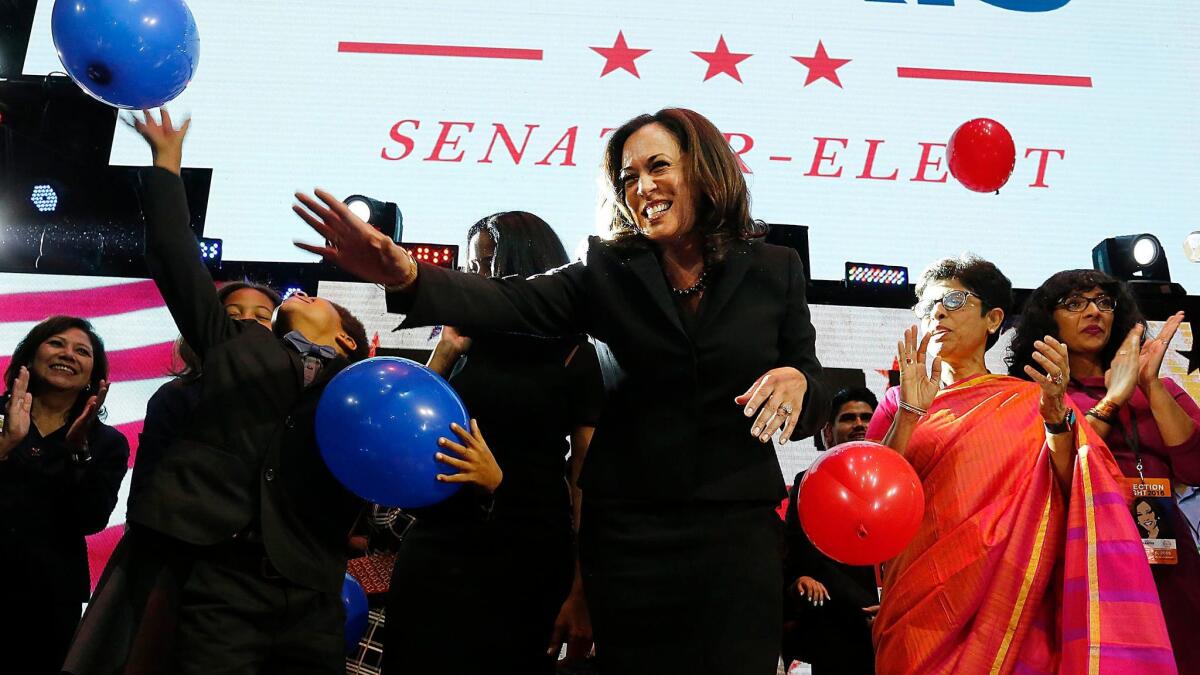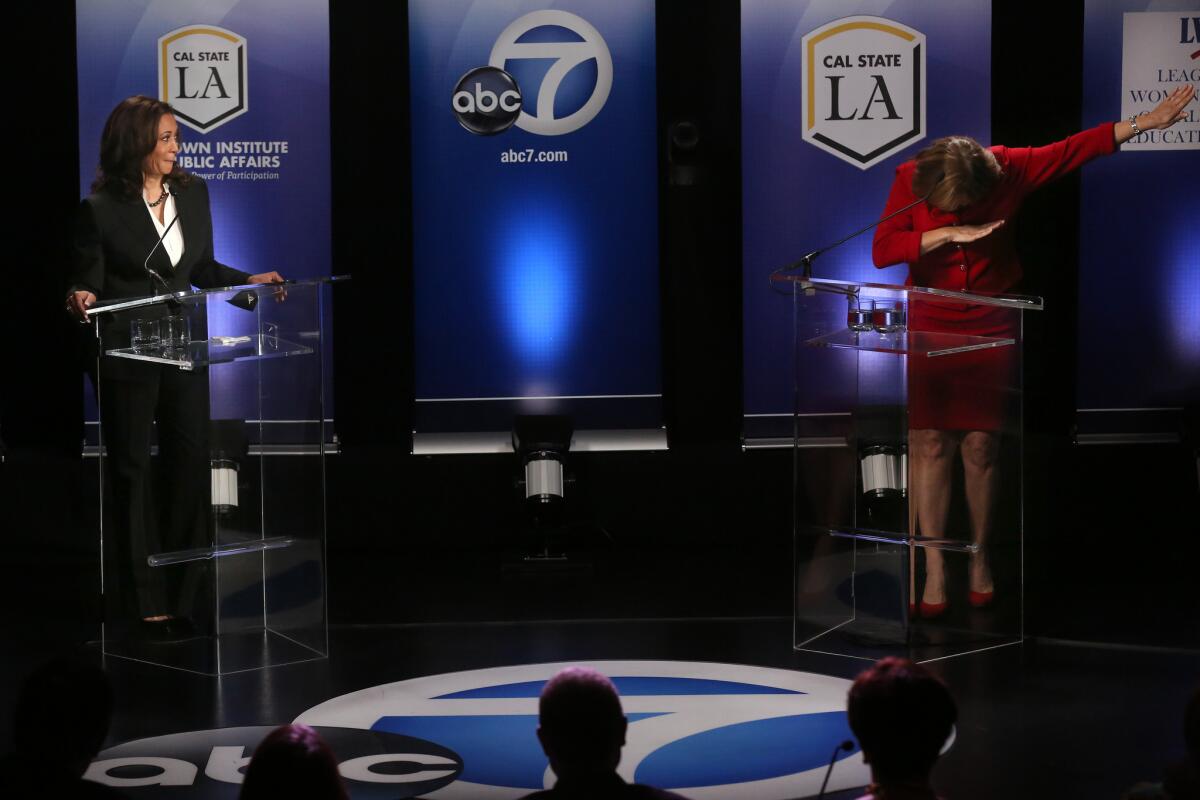Kamala Harris breaks a color barrier with her U.S. Senate win
- Share via
California voters elected Kamala Harris, the daughter of immigrants from India and Jamaica, to the U.S. Senate on Tuesday, tearing down a color barrier that has stood for as long as California statehood.
The Associated Press called the race minutes after the polls closed, with no votes yet reported. Early returns with less than half the vote counted showed Harris winning by more than 1.3 million votes.
From the outset, the Senate race between Democrats Harris and Orange County Rep. Loretta Sanchez possessed an air of history in the making. California had never before elected a black or Latino politician to the United States Senate, and Harris will become only the second black woman in the nation’s history to serve in Congress’ upper chamber.
Even in a state often perceived as liberal outlier, Harris’ victory to succeed retiring Sen. Barbara Boxer provides another significant marker in the march for political equality during her lifetime. Her elementary school class in the 1970s was the second one to integrate Berkeley schools. Harris was the first woman elected as San Francisco’s district attorney and the first woman to be elected as California’s attorney general.
Harris supporters looked nervous at her party at a night club in downtown Los Angeles, but not about the Senate campaign.

As Hillary Clinton trailed Donald Trump in the presidential race, Harris supporters were watching the giant TV screen looming over the dance floor.
“We’re a bit concerned about what’s happening nationally,” said Angelov Farooq, director of UC Riverside’s Center for Economic Development & Innovation. “But I’m excited about Kamala Harris. I think she represents the future. She’s a very authentic leader.”
Harris used her acceptance speech to address what seemed to be an impending Trump victory.
“Whatever the results of the presidential election tonight, we know that we have a task in front of us. We know the stakes are high,” Harris told a cheering crowd inside Exchange LA. “When we have been attacked and when our ideals and fundamental ideals are being attacked, do we retreat or do we fight? I say we fight!”
Follow California election results »
Immersed as a child in the 1960s Berkeley civil rights movement, the 52-year-old California attorney general weaved populist themes of justice and redemption into her Senate campaign and leaned heavily on the old-school political tactics honed during her political rise in San Francisco, responding sharply and quickly to Sanchez’s political attacks and subtly launching a few of her own.
Harris’ background attracted Lee Lovingood, 34, to vote for her.
“Her victory is going to be pretty historical, right?” Lovingood said. “She’s going to be the first African American and Indian American senator from California.” He said Harris had a more positive message while Sanchez “says some wild things.”
In the campaign for the first open Senate seat California has seen in 24 years, Harris quickly cemented herself as the Democratic Party’s favored candidate, dissuading some of California’s big-name politicians from challenging her, including former Los Angeles Mayor Antonio Villaraigosa and Lt. Gov. Gavin Newsom.

Harris appeared to have prevailed in all but three of California’s 58 counties. One county had reported no votes by 11:30 p.m.
Sanchez was smiling and seemed upbeat as she greeted supporters in Santa Ana on Tuesday, hours after the Associated Press had called the race for her opponent.
Sanchez did not concede the race.
“Actually, the Associated Press already said that my opponent has won,” Sanchez told the crowd, gathered in a campaign office-turned-party venue. “But I don’t believe that. I don’t believe that yet.”
Sanchez thanked her supporters, friends and family for their efforts and for getting voters engaged in the campaign. “Even if we don’t make it over the line tonight ... never underestimate Loretta Sanchez,” she told them.
The Harris-Sanchez contest was the first major test of California’s top-two primary system, an experiment in democracy that state voters approved in 2010 in an effort to temper the highly partisan influence of the Democratic and Republican parties and give independents and moderates more clout in the political process.
In this go-around, the California Democratic Party support for Harris played a significant role in her victory, since the party endorsed her in February and provided close to $700,000 to the Harris campaign — and not a dime to Sanchez.
“I think for voters, this race was confusing,” Sonenshein added. “In a society that is extremely divided by party, where partisanship seems to color everything everyone does, it is certainly hard for voters to navigate when both candidates are in the same party.”
Harris and Sanchez topped the field of 34 candidates in the June 7 primary, sending the two Democrats to the November runoff and denying a Republican a spot on the fall ballot for the first time since the state began directly electing its U.S. senators in 1914. Harris won that race 40% to 18.6% for Sanchez.
The Senate race began just days after Boxer announced she was retiring at the end of her fourth term in the U.S. Senate.
Boxer’s departure dangled a coveted political gem in front of younger generations of California politicians who had been biding their time to run for one of the state’s most prestigious political offices. She and fellow Democrat Dianne Feinstein have held their posts since 1992, and Jerry Brown is serving a historic fourth term as California governor, albeit in two separate stints. All three were born before World War II.
Harris seized the opportunity and launched her Senate bid just days after Boxer’s announcement. The two-term attorney general immediately locked up the successful San Francisco political consulting team led by veteran Ace Smith, who has worked for Hillary Clinton and Brown, began raising money and snatched up endorsements from Democrats across the nation — including from big names such as Sens. Elizabeth Warren of Massachusetts and Cory Booker of New Jersey.
FULL COVERAGE: 2016 election day »
Over the following weeks, a list of California’s Democratic heavyweights flirted with a run before taking a pass, including Newsom, Villaraigosa and billionaire environmental activist Tom Steyer.
Sanchez, who considered a run for governor in 2010, launched her Senate bid in May 2015, four months after Harris’ announcement.
The congresswoman first rose to national prominence two decades ago when, as a little-known financial analyst from Anaheim, she beat archconservative Rep. Robert “B-1 Bob” Dornan for Congress in 1996. Sanchez’s victory provided hope that the long-waited political ascension of Latinos in Orange County, as well as California and the nation, was taking root outside the urban cores of America’s biggest cities.
But Sanchez, who already was known for her flamboyant personality and off-the-cuff political style, stumbled from the outset.
The launch of her campaign was flubbed when a “draft” announcement was leaked to reporters days before she was ready. Sanchez also was singed by criticism for imitating a Native American “war cry” and for saying 5% to 20% of Muslims supported the establishment of a strict Islamic state. When President Obama endorsed Harris, his longtime political ally, in July, Sanchez implied on television that it was in part because both are black.
Either way, Sanchez’s campaign never caught fire. The congresswoman, not well known to many Californians outside of Orange County, struggled to raise money.
Perhaps because a Democrat was guaranteed to win no matter the outcome, the race also failed to attract the millions of dollars in spending by super PACs, unlike other Democrat-versus-Republican Senate contests across the nation.
Sanchez out of necessity tried to patch together support from Latinos, Republicans and independents. She campaigned as a fiscal moderate and expert on national defense, touting endorsements from Republicans such as former Los Angeles Mayor Richard Riordan.
The candidates debated just once, with the most memorable moment coming when Sanchez performed a “dab” at the end of her closing statement.
Harris hewed her campaign to the Democratic Party’s liberal base, picking up the support of major labor unions, environmental organizations and pro-choice groups, especially after Democratic Party leaders began to coalesce behind her: the governor, the president and finally Boxer and Feinstein.
Throughout her carefully orchestrated campaign, Harris was careful to avoid blunders or give Sanchez a window to close the gap. Though at times accused of being overly cautious and scripted, Harris nevertheless led comfortably in every pre-election poll.
Nina Agrawal contributed to this report.
Twitter: @philwillon
ALSO:
How race helped shape the politics of Senate candidate Kamala Harris
8 things to know about Senate candidate Kamala Harris’ career gold stars and demerits
Kamala Harris should take bolder action on police shootings, civil rights advocates say
California’s next senator could be a Latina. Will her past mistakes get in the way?
8 things to know about Senate hopeful Loretta Sanchez’s 20-year political career
Hurting for support in her own party, Rep. Loretta Sanchez tilts her Senate campaign to the right
Loretta Sanchez has gone negative. Now she’s risking fallout for a future in the Democratic Party
UPDATES:
11:55 p.m.: This article was updated with quotes from the Sanchez party.
11:30 p.m.: This article was updated with quotes from the Harris victory party.
This article was originally published at 9 p.m.
More to Read
Get the L.A. Times Politics newsletter
Deeply reported insights into legislation, politics and policy from Sacramento, Washington and beyond. In your inbox twice per week.
You may occasionally receive promotional content from the Los Angeles Times.











